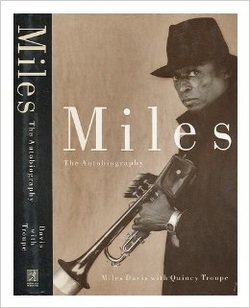|
Miles: The Autobiography
by Miles Davis with Quincy Troupe Arguably the very centerpiece of jazz’s post-bop era, Miles Davis occupied one of the most visible positions in music for more than 40 years and was an enormous influence on scores of musicians whose lives he touched. Consider the musicians who were part of Davis’s bands and the heights they achieved after moving on: John Coltrane, Bill Evans, Julian Cannonball Adderly, Sonny Rollins, Herbie Hancock, Wayne Shorter, Tony Williams, Ron Carter. And that’s only scratching the surface. There are, of course, many biographies of Miles, but this is the one and only autobiography: a lifetime account in the artist’s own words, as told to Quincy Troupe. It’s all in here: his drug addiction and agonizing cold-turkey withdrawal, his contempt for lesser artists, his disinterest in his audiences, his anger about racism, along with his deep respect and affection for his mentors and peers, the women in his life. And it’s in Miles’s own language: direct and routinely vulgar. In Miles: The Autobiography, Davis tells in detail of his growing up in East St. Louis, the son of a dentist, in a middle-class black family. He tells of his early learning experiences with the trumpet and of the local jazz musicians from whom he learned, including Clark Terry. And, of course, he tells of his move to New York to study at Juilliard and how he ended up skipping school to play with Charlie Parker, Max Roach and the others who were creating bebop in those days—perhaps receiving his real musical education. What emerges here is a portrait of a complex artist (surprise, surprise), full of passion, anger and ambition, one who expressed himself in music, in painting, and even in boxing. We see Miles constantly evolving, moving on always to a new sound, a new format, leaving behind any interest in what he’d played before. There’s an intimacy, too, about the book, the reader feeling as if he’s been in a long and engaging conversation with Miles. It’s a reflection, no doubt, of Miles’s candor and his trust in Quincy Troupe who took down the artist’s words, recorded him, and organized it all. Quincy Thomas Troupe, Jr. is an American poet, editor, journalist and professor emeritus at the University of California, San Diego. In 1985, Spin Magazine asked him to interview Miles Davis and provide a write-up for the Magazine. After the article’s appearance, Simon and Shuster came to Troupe with an offer to co-author a Miles Davis autobiography. The book was published in 1990. |
Copyright ©2024 Seacoast Jazz Society, All Rights Reserved



